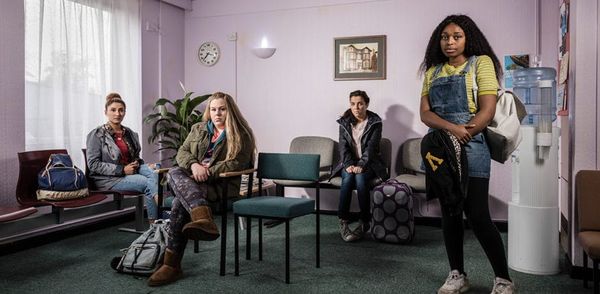Eye For Film >> Movies >> I Told My Mum I Was On An R.E. Trip (2018) Film Review
I Told My Mum I Was On An R.E. Trip
Reviewed by: Jennie Kermode

When discussions of abortion are politicised and polarised, when it's the worst thing one can possibly do or something about which one should never feel shame or regret, many voices get lost. Lindy Heymann's film provides a platform for some of those voices.
The format is simple. Four young actresses read out the true stories of girls and women who have gone through with pregnancy terminations. Some of them have had children since. One had a child beforehand but felt she just couldn't cope with another, that it would make it impossible for her to do right by her existing daughter. Most but not all of the contributors lack the support of the boys or men who got them pregnant in the first place. For the majority, it happened whilst they were still living with their parents. The title is just one of the cover stories they used when they didn't trust those parents to help them.
Confiding in parents isn't an option for everyone. One contributor recalls being threatened with a knife by her mother just for falling asleep and forgetting to call until two in the morning after going out, and asks viewers to consider what her mother’s reaction would have been like if she’d announced that she was pregnant. Others reference strained relationships between their parents which they didn't want to exacerbate.
Many of the contributors were Northern Irish. They speak of the complicated business of travelling across the sea and back whilst trying to maintain secrecy. For others, going to a clinic close to home presents its own problems. What if you see somebody you know? She's probably there for the same reason, but what then? The silences. The unspoken understanding between classmates who try to carry on as they always did, or at least appear to, never hinting to others that they have inhabited a different world.
Poor education and miseducation seem to have played their part. One girl explains that her understanding of abortion came from a video shown at school with “what looked like a full term baby” and a horror soundtrack. Another acknowledges her own incompetence when it came to taking contraceptive pills, putting it down to the disorganised approach to life common at that age. Gynaecologists and other clinic staff are also interviewed here, some speaking of the despair they feel at the handful of girls who show up on multiple occasions, apparently learning nothing from the experience. They understand how distressing abortion can be and try not to pass judgement, but what they see has an emotional effect on them too.
Speaking in what look like empty classrooms, on the terraces of housing estates and in the kind of ruined buildings where teenagers go for illicit cider and cigarettes and sex, the actresses capture something of the environment in which unplanned pregnancies occur again and again. If there's criticism due here, it's that these spaces suggest this is primarily a working class problem, but Heymann also wants to contrast it with the atmosphere in the clinics. "There was a waiting room with magazines and water coolers and televisions showing Jeremy Kyle," reports one contributor, describing attempts to make that contrast less intimidating.
Many of the girls and women whose stories are shared here are sad about what they went through, but others stress their relief that the option was available to them, speculating on how different their lives would now be if they'd gone through with their pregnancies. Their views on the morality of the procedure are mixed, but what comes across most clearly here is the very personal nature of it. The frankness of these stories means that many viewers will find something they can relate to, whilst others will find that it helps them to make difficult decisions of their own, one way or another. Heymann's film is patient and humane, setting aside the familiar mechanics of 'debate' to focus on dealing with the world as it is.
Reviewed on: 23 Feb 2020















